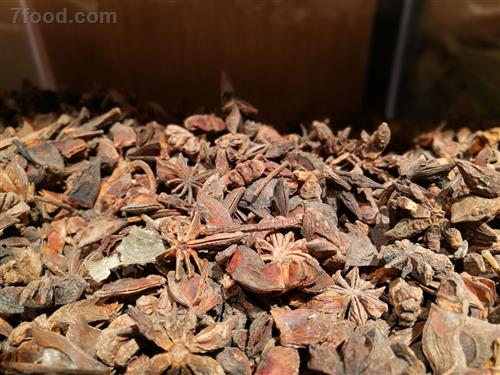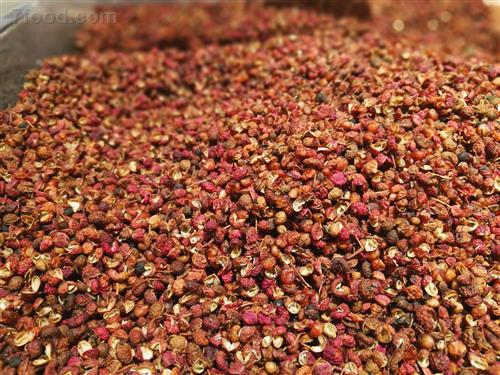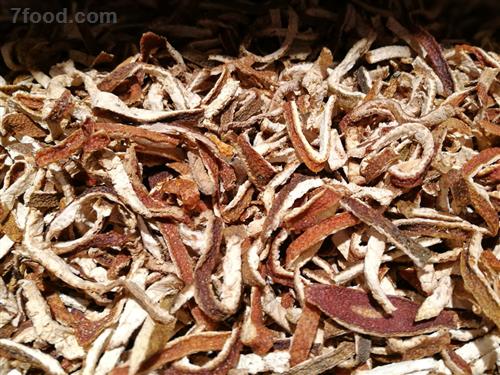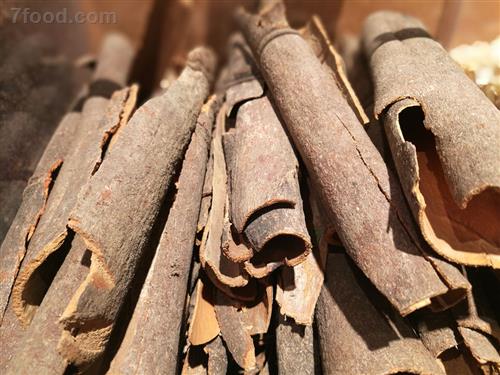1. Octagon Star anise is an indispensable condiment for making cold dishes, stews, and clams. Its role is less than that of other spices and it is also the main raw material for processing allspice. Fruits and seeds can be used as a seasoning and used as medicine by Chinese traditional medicine. The medical theory believes that it has a strong aroma, insect repellent, qi and qi, gastrointestinal vomiting, cold, excited nerve and other effects. Mustard Mustard, hot and non-toxic, with warm and cold, Tongli five internal organs, the role of Lee Tiao appetizers, can Jiuli, Jianwei Xiaoshi and so on. Mustard spicy can stimulate the secretion of saliva and gastric juice. It has appetizing power and can enhance people's appetite. It also has a detoxification function that can detoxify fish and crabs, so fresh foods such as raw salmon are often accompanied by mustard. 3. Ginger Ginger also has an anti-aging effect. Its spicy ingredients can inhibit the production of lipid peroxides, and have the effect of anti-aging and anti-aging. The free radicals in the human body are a kind of aging factor. If it is over-active, it can cause premature aging. Ginger's gingerol can effectively control free radicals. A large amount of Gingerol, Gingerin and other ingredients in Ginger can inhibit the synthesis of prostaglandins, reduce the mucin content in bile, maintain the balance of various substances in bile, and not cause excessive mucin, and calcium ions and bilirubin in bile. In combination with the formation of stones, it also helps the gall bladder to prevent and prevent the formation of gallstones and is beneficial to patients with cholecystitis. In addition to containing zingerone, gingerol, and gingerol, it also contains proteins, sugars, fats, and abundant iron salts. Can be used for colds, headaches, stuffy nose, vomiting, etc., but also in the stomach cold. Chinese medicine practitioners believe that ginger has a mild and warm taste, and it has effects such as publication, anti-vomiting, expectoration, aiding digestion, and secretory secretion. It can prevent cold, vomiting, and coughing. Therefore, when a cold catches a cold, eating a few slices of ginger or boiling ginger brown sugar can promote blood circulation, make the body sweat and relieve cold symptoms. 4. Cheese Not all cheese is a good source of probiotics, but there are soft, fermented cheeses such as cheddar cheese, Swiss cheese, Parmesan cheese, and more. Probiotics contained in cheese can survive in the intestines and continue to fuel your health. These cheeses are formed by fermentation and probiotics are also created in this process. 5. Chinese pepper Pepper is the peel of Rutaceae's Zanthoxylum bungeanum. It has a rich aroma and is a must-have condiment for home. With the functions of regular wormwood, flavoring pungent and removing phlegm, it ranks first in the seasoning “Thirteen Aromas†and is known as the “King of Seasoningâ€. Zanthoxylum bungeanum is also a traditional Chinese medicine, and Shennongboshi Caojing listed it as a medium-sized product. Its medicinal properties are hot, thanks to spleen, stomach, and kidneys, it has aromas and spleen, warm cold, dehumidification, detoxification, and itching. Li Shizhen in the "Compendium of Materia Medica" in the day: "Zijiao teeth, UFA, eyesight, Jiufu good color, enduring old age, new year, God." Modern medical research shows that pepper contains volatile oil, alkaloids, coumarin And organic acids, with local anesthesia, analgesic, anti-inflammatory, inhibitory, anti-oxidation, anti-tumor, insecticidal and other pharmacological activities. 6. Coriander Chinese medicine believes that parsley is spicy, warm, into the lungs, spleen, diarrhea and rash, eliminate the power of the next gas, apply to colds, pediatric measles or rubella through poor hair, dietary stagnation, indigestion and so on. In addition, the aroma of coriander is caused by the volatile oil composed of alcohols and alkenes and potassium malate. After eating, it can increase the secretion of gastric juice, increase appetite, regulate gastrointestinal motility, and improve digestion. 7. Pepper Pepper is the most common condiment. It is often seen on the table with salt. Pepper can even be used instead of salt. Pepper is particularly suitable for people who are obese, because it helps metabolism and can also act as an exhaust. Stimuli produce saliva, gastric juice and pancreatic juice. Helps digest high-fat foods. 8. Orange peel Citrus is fragrant, spicy and bitter. It has the effects of regulating Qi and reducing stress, regulating Chinese appetizers, dampness and removing phlegm. Indications of spleen and stomach qi stagnation, chest fullness stuffy, abdominal distention pain, do not think of diet, vomiting, hiccups, two will be unfavorable, lung block, cough and more, but also rule the beginning of breast milk. 9. Onions Onions contain protein, fat, sugar, vitamins, carotene, calcium, magnesium and iron. Excited nerves, increased appetite, stimulate blood circulation and promote sweating. The spicy pungent smell of onions has a bactericidal effect. Raw green onions can promote digestion, disinfection, and prevention of intestinal infectious diseases. Insomnia, gastrointestinal diseases, vitamin C deficiency, burns, burns have a role. Onions also have anti-allergic effects, eat fish allergies, can be washed green onions in the fish, cooking or decoction. If allergic shrimps are eaten, shrimps can be fried together with green onions. 10. Garlic Garlic contains protein, fat, sugar, volatile oil, vitamins, trace elements and minerals such as calcium, phosphorus, iron, etc. It also contains allicin and allicin, which can eliminate fat accumulated in blood vessels and help lower cholesterol and glycerol. The ester content plays a role in the prevention of cardiovascular diseases such as arteriosclerosis, hypertension, coronary heart disease, and hyperlipidemia. Garlic can not only reduce arteriosclerosis plaque, prevent arteriosclerosis, but also have certain effect on prevention of myocardial infarction. Garlic also dissolves blood stasis in the body, preventing accumulation of harmful substances in the blood vessels and preventing thrombosis. 11. Chili Pepper contains protein, sugar, organic acids, vitamins, and inorganic salts such as calcium, phosphorus, iron, and magnesium. Chinese medicine believes that pepper has the effect of warming and dispelling cold and has a certain effect on chills, stomach pain and loss of appetite. It can eliminate cold and dampness in the stomach and stop the pain caused by acid. Pepper contains capsaicin, which can increase the secretion of gastric juice, increase appetite, help digestion, and has obvious inhibitory effects on certain bacteria, such as Bacillus subtilis. External application of pepper can make local blood vessels expand, promote blood circulation, have a significant effect on rheumatic pain, psoas muscle pain. 12. Soy sauce Soy sauce contains protein, carbohydrates, calcium, phosphorus, iron, vitamin B1, vitamin B2, nicotinic acid, and amino acids. The amino acids contained in soy sauce are indispensable substances for the growth and development of the human body and contain various beneficial enzymes, yeasts, and lactic acid bacteria that promote digestion and absorption. The proper amount of soy sauce for stir-frying can increase iron and help the hematopoietic system. Soy sauce has a strong killing effect against typhoid bacillus, staphylococcus, dysentery bacillus and other pathogens. Soy sauce contains more than 300 aroma components, some of which have anti-cancer effects. 13. Vinegar Vinegar contains acetic acid, water, carbohydrates, ashes, thiamine, riboflavin, niacin, and various amino acids. In addition to seasoning, vinegar has the effect of inhibiting and killing bacteria. Chinese medicine believes that vinegar has scattered phlegm, bleeding, detoxification, insecticidal effect. Vinegar can also be used to lose weight, because it contains more amino acids, can promote the decomposition of body fat, and speed up the metabolism of sugar to lose weight. Peanuts are soaked in vinegar and eaten 7 days later. Each day, morning and evening, 10 times each time. Long-term consumption can lower blood pressure, soften blood vessels, lower cholesterol, and help prevent cardiovascular and cerebrovascular diseases. Using vinegar to cook peanuts or soybeans also has the effect of reducing blood pressure and lipids. After vinegar and rock sugar are mixed and dissolved, take 1 tablespoon after a meal to prevent and treat hypertension, high cholesterol, coronary heart disease and obesity. Vinegar also has anti-aging effects. The high content of amino acids in vinegar can effectively inhibit human aging and prevent geriatric diseases, speed up metabolism and anti-aging. 14. Sugar Sugar has the effect of making the dishes sweet, improving nutrition, smoothing the finished surface, and turning golden or brown after heating. Exercise needs to add the right amount of sugar, can increase blood sugar levels, increase the supply of energy, save muscle glycogen loss, reduce the ratio of protein and fatty acid energy supply, delay the occurrence of fatigue. Sugar water can also stimulate the stomach and help digestion. 15. Fennel As a supplementary material, fennel can be used to add flavor, especially for stews. There are functions such as removing phlegm, promoting appetite, cramping, driving wind, fighting phlegm, constipation, and prolonging sleep time. In addition, it also helps prevent gastrointestinal infections, relieve fullness and abdominal cramps. 16. Curry Adding curry to the cooking can increase the spicyness, flavoring, decoction, and taste. There is a cold, stomach, phlegm, increase the role of appetite. 17. Cassia Cinnamon, also known as cinnamon, is one of the earliest spices eaten by humans. It has aromas and fragrances that can make meat dishes unpleasant and appetizing. Cinnamon is rich in dietary fiber, iron, calcium, manganese, vitamin C, vitamin E and other minerals and trace elements. The anti-microbial substances also help to preserve foods and delay the deterioration of foods. Cinnamon is also a traditional Chinese medicine. Its medicinal properties include helping digestion, removing cold, stopping diarrhea, removing breath, relieving toothache, lowering cholesterol, and assisting in the treatment of diabetes. Western medicine research found that its antioxidant effect is also very good, and the cinnamon flavor can also improve attention and memory. 18. Green Bean Pods Mungbean pods are the third most expensive seasoning after saffron and vanilla beans. Their soft and delicate flavors are often used to make delicious curry powders. Mungbean pods are used to relieve inflammation of the mouth and throat, and pleural inflammation including tuberculosis. 19. Clove Clove, fragrant, spicy and tingling, mainly used for seasoning of meat, cakes, preserved foods, roasted seeds, preserves, and drinks. Clove is a good friend of the dentist. It can relieve toothache and bring fresh breath. Therefore, many brands of mouthwash contain cloves. With its mouthwash, you can also prevent colds and sore throats. 20. Suddenly Suddenly, also known as cumin. Unique taste, rich in oil, aromatic and strong smell, after grinding into powder or grind, used to cook beef, lamb can go licking, greasy, and can make the meat more delicious. It is an antidote to flatulence, belching and headaches. It can also be applied externally to some painful areas or wounds to provide anti-inflammatory effects. Medical Device Consumables,Consumables Medical Products,Disposable Medical Paper Mouthpieces,Disposable Filter Spirometer Mouthpiece Hengshui Qifei Paper Products Co. LTD , https://www.hengshuiqifei.com



The efficacy of 20 kinds of common seasonings
